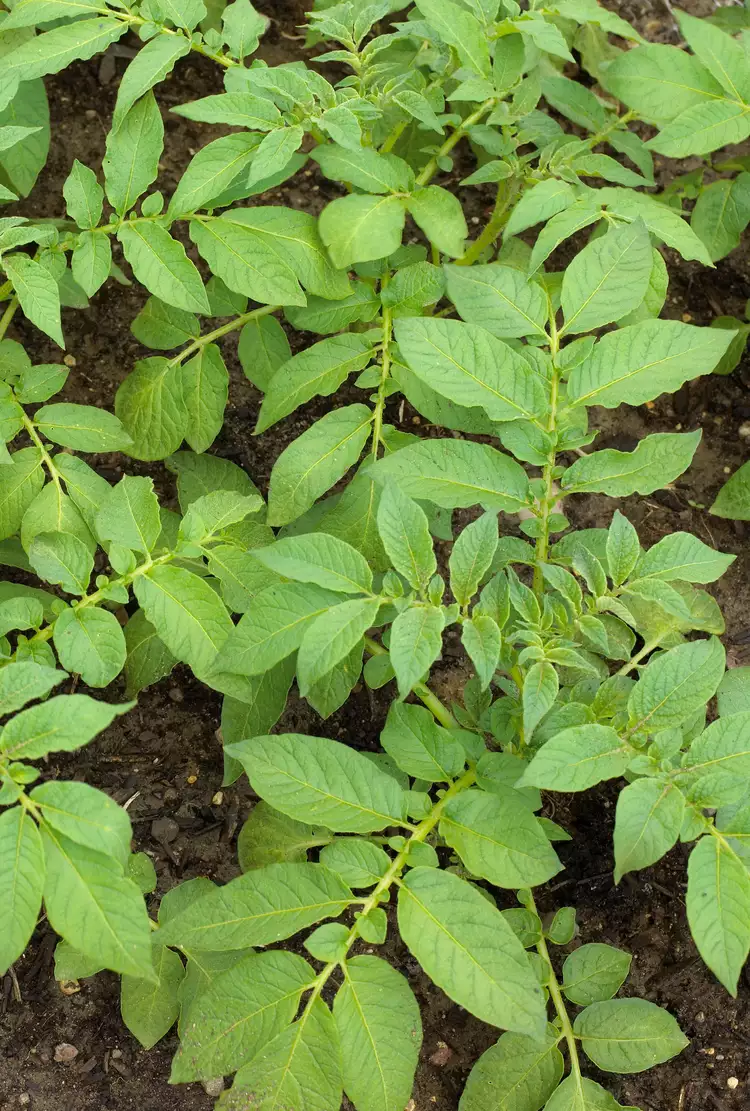What Not to Plant with Tomatoes: 10 Companions to Avoid

Choosing the right tomato companion plants can help you grow healthier tomatoes and naturally repel pests like hornworms. Knowing what not to plant with tomatoes can be just as important for a good harvest and healthier garden. Some plants compete with tomatoes for soil nutrients, while others can attract pests and leave you with damaged tomato fruit. As you plan your garden this season, avoid planting the following crops near your tomatoes to keep the plants as prolific and healthy as possible.
Potatoes
Tomatoes and potatoes are both in the nightshade family, and they’re vulnerable to many of the same pests and diseases, including late blight and early blight. On top of that, potatoes and tomatoes are both heavy feeders that compete with each other for soil nutrients. Grow these plants as far apart as possible and always sterilize gardening tools in between plants to limit disease spread.
Corn
Corn and tomatoes coexist in salsa and many other savory treats, but they’re not good companions in the garden. These crops are targeted by the same caterpillar species—known as the “corn earworm” on corn plants and the “tomato fruitworm” on tomatoes. Growing these plants together makes them doubly attractive to this pesky insect, while companion planting with dill and yarrow helps naturally control the pest caterpillars.
Eggplant
Like potatoes, eggplants are closely related to tomatoes, which makes them susceptible to many of the same problems. Blight can affect eggplants as readily as it affects tomatoes, and nightshades planted closely together can cause blight spores to spread rapidly through garden beds. Eggplants also love lots of sun and don’t do well in the shade of taller tomatoes.
Ground Cherry
Ground cherry plants aren’t as commonly grown in vegetable gardens as other crops, but they are prized for their sweet fruit and low maintenance needs. While ground cherries are a treat for gardeners, they are another nightshade plant that causes problems for nearby tomatoes. Specifically, ground cherries are prone to many of the same pests and diseases as tomato plants, and they also compete with tomatoes for nutrients.
Large Brassicas
Tomatoes can grow with smaller brassica plants like collard greens and radishes, but it’s best to avoid planting tomatoes with larger cole crops. Plants like Brussels sprouts, cabbage, cauliflower, and broccoli are especially heavy feeders, and they compete for resources and reduce the yield of neighboring tomato plants. Some gardeners have success growing a variety of brassicas with tomatoes, but these demanding crops need extra nutrients to keep them happy.
Rosemary
Rosemary and tomatoes have different care requirements, and growing them together creates unnecessary work for gardeners. Rosemary thrives in dry soil and doesn’t need a lot of nutrients, while tomatoes need frequent watering and regular applications of fertilizer. If you want to grow tomatoes with herb plants, you’ll have better luck with basil.
Cucumbers
Tomatoes and cucumbers can sometimes grow well together, but their relationship is tricky. Not only are they susceptible to some of the same diseases, but these plants are both heavy feeders. Plus, vining cucumbers may cast too much shade on tomatoes and stunt their growth. If you want to grow cucumbers and tomatoes together, follow proper spacing guidelines to limit plant competition and reduce the spread of diseases like powdery mildew.
Fennel
Fennel is difficult to grow in vegetable gardens because it doesn’t get along with most other plants. While fennel smells delicious to us, it is an allelopathic crop, meaning it releases compounds into the soil that inhibit the growth of neighboring plants. It’s best to plant fennel alone in pots or a dedicated raised bed.
Sweet Potatoes
Sweet potatoes aren’t related to potatoes, but they are still not good companion plants for tomatoes. Like other heavy feeders, sweet potatoes compete with tomatoes for nutrients, causing the tomatoes to grow more slowly. Beyond that, sweet potatoes can spread diseases like fusarium wilt to neighboring tomato plants, and harvesting sweet potatoes disturbs tomato plant roots.
Walnuts
Walnuts are another allelopathic plant that suppresses the growth of nearby crops. Like fennel, walnuts use allelopathy to limit competition from other plants, making them difficult to keep in gardens. Nightshades, including tomatoes, are particularly sensitive to the chemical released by walnuts, but you can grow nightshades in a garden with walnuts if you keep your plants in containers.